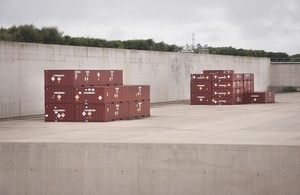Planning approval secured for extra vaults at Low Level Waste Repository
Planners in Cumbria have given the go-ahead for two new vaults at the UK’s Low Level Waste Repository (LLWR), along with an extension to a third vault.

Vault 9 at Low Level Waste Repository, Cumbria
The news will ensure the future of the facility, near Drigg, until 2050, creating around 120 construction jobs and securing existing roles.
LLWR was opened in 1957 as the only UK location for the disposal of solid waste containing low levels of radioactivity. It provides an essential service for NDA sites as well as other industries that produce low level waste(LLW). More than £100 million has been invested in the site’s infrastructure over the past decade to maintain it as an important national asset.
Many years of work were required to prepare the planning application, approved by Cumbria County Council, including submission of a detailed Environmental Safety Case covering geology, hydrogeology, waste characterisation, waste processing, engineering of the waste vaults, potential radiological impacts, coastal erosion and engagement with stakeholders.
Dennis Thompson, Managing Director of LLW Repository Ltd, said:
We are absolutely delighted. After three years of hard work, millions of pounds of investment, utilising dozens of technical and scientific experts, we submitted a substantive technical document that makes the case that it is safe to dispose of low level waste (LLW) at the site.
We submitted this case to the Environment Agency, and they did the same thing. They spent an additional three years reviewing it in detail. Every calculation, every model, every assumption was re-reviewed by the EA and their experts and they concluded that the case is made. It is safe to dispose of LLW at the LLWR both now and centuries into the future.
Planning permission also allows the construction of a final cap over existing and new vaults and seven clay-lined trenches, where waste was disposed of before the first engineered vault opened 1988.
Dr Richard Cummings, Head of Science and Engineering at LLWR, said:
We have no greater priority than the safety of people and the environment, which is why such a huge amount of work went in over three years to produce our Environmental Safety Case (ESC), on which our planning application was based.
We had 80 technical experts working on it and considered environmental safety now and up to thousands of years into the future. The ESC comprised 17 reports and a non-technical summary, plus a further 100 underpinning reports. When complete, it was subject to independent review by the Environment Agency, who concluded we had met their very stringent safety requirements and it was safe to continue to dispose of low level waste at the Repository.
Work is expected to start in 2017 and construction phase impacts will be carefully managed and monitored to ensure minimum disruption to local residents.